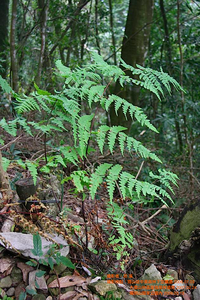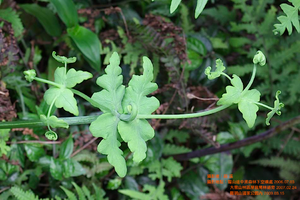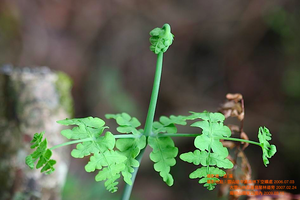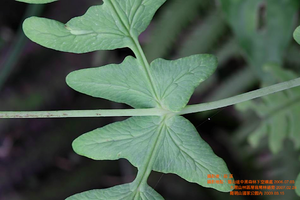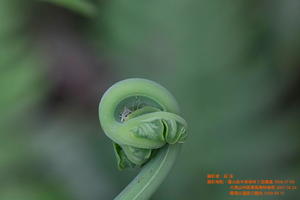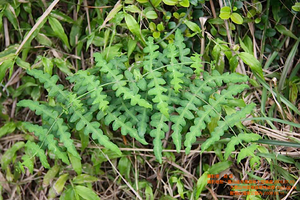栗蕨
出自台灣有毒中草藥毒性資料庫
(→植物圖片) |
(→毒性分級) |
||
| (7個中途的修訂版本沒有顯示) | |||
| 第1行: | 第1行: | ||
| - | [http://tcm-toxic.kmu.edu.tw/index.php/% | + | __NOTOC__ |
| + | {| | ||
| + | ||[http://tcm-toxic.kmu.edu.tw/index.php/%E5%AD%B8%E5%90%8D 中英文學名] | ||
| + | ||[http://tcm-toxic.kmu.edu.tw/index.php/%E7%A2%97%E8%95%A8%E7%A7%91 科別] | ||
| + | |||
| + | ||[http://tcm-toxic.kmu.edu.tw/index.php/%E6%AF%92%E6%80%A7 毒性] | ||
| + | |||
| + | ||[http://tcm-toxic.kmu.edu.tw/index.php/%E7%97%87%E7%8B%80 症狀] | ||
| + | |} | ||
== '''基本資料''' == | == '''基本資料''' == | ||
{| border="2" style="border-collapse;" | {| border="2" style="border-collapse;" | ||
|| | || | ||
| - | <font size= | + | <font size=4>'''科別'''</font> |
| - | ||<font size= | + | ||<font size=4>碗蕨科 Dennstaedtiaceae</font> |
|- | |- | ||
|| | || | ||
| - | <font size= | + | <font size=4>'''屬名'''</font> |
| - | ||<font size= | + | ||<font size=4>栗蕨屬 ''Histiopteris (Ag.) J. Sm.''</font> |
|- | |- | ||
|| | || | ||
| - | <font size= | + | <font size=4>'''中文學名'''</font> |
| - | ||<font size= | + | ||<font size=4>栗蕨 </font> |
|- | |- | ||
|| | || | ||
| - | <font size= | + | <font size=4>'''拉丁學名'''</font> |
| - | ||<font size= | + | ||<font size=4>''Histiopteris incisa'' (Thunb.) J. Sm.</font> |
|- | |- | ||
|| | || | ||
| - | <font size= | + | <font size=4>'''英文名稱'''</font> |
| - | ||<font size= | + | ||<font size=4> Incised Histiopteris </font> |
|- | |- | ||
|| | || | ||
| - | <font size= | + | <font size=4>'''中文俗名'''</font> |
| - | ||<font size= | + | ||<font size=4> 北投羊齒、溫泉蕨 </font> |
|} | |} | ||
| - | [1] | + | <font size=4>[1]</font> |
| + | |||
== '''栗蕨簡介''' == | == '''栗蕨簡介''' == | ||
| - | <font size= | + | <font size=4>蕨為世界上最長見的植物物種之一,主要分布在熱帶及亞熱帶地區[1]。由於生長在野外,因此牛羊放牧時,可能會被牛羊食入,曾有文獻報導牛隻吃入蕨之後中毒的情況[2],而牛隻食入蕨之後,所產出的奶也帶有蕨的有毒成份在內[3]。栗蕨為蕨的一種,在蕨的有毒成份ptaquiloside被分離確認之後,栗蕨也經分析發現帶有此種有毒成分。Ptaquiloside存於多數的蕨當中,且具有基因毒性存在,會與DNA共價(covalent)結合形成DNA adduct導致DNA斷裂,因此不可食用[4-6]。</font> |
| + | |||
| - | == '''外觀簡述''' == | + | == '''外觀簡述'''[1]== |
{| border="2" style="border-collapse;" | {| border="2" style="border-collapse;" | ||
|| | || | ||
| - | <font size= | + | <font size=4>'''莖'''</font> |
| - | ||<font size= | + | ||<font size=4> 根莖長條匍匐狀,外表披覆有栗色鱗片。柄長可達15-200公分,柄肥大,深色近黑,外表光亮,直徑可達1.5公分。 </font> |
|- | |- | ||
|| | || | ||
| - | <font size= | + | <font size=4>'''葉'''</font> |
| - | ||<font size= | + | ||<font size=4> 葉長沒有一定標準,可長達一到數公尺。二回或三回羽狀葉,葉呈紙質狀(papyraceous)或革質狀(subcoriaceous) </font> |
|} | |} | ||
| - | |||
== '''植物圖片''' == | == '''植物圖片''' == | ||
| + | <font size=4> | ||
{| border="2" style="border-collapse;" | {| border="2" style="border-collapse;" | ||
|| | || | ||
| - | [[檔案:栗蕨07.png| | + | [[檔案:栗蕨07.png|200px|栗蕨全株]] |
栗蕨全株 | 栗蕨全株 | ||
|| | || | ||
| - | [[檔案:栗蕨-葉11.png| | + | [[檔案:栗蕨-葉11.png|300px|栗蕨葉正面]] |
栗蕨葉正面 | 栗蕨葉正面 | ||
|| | || | ||
| - | [[檔案:栗蕨-嫩芽2.png| | + | [[檔案:栗蕨-嫩芽2.png|300px|栗蕨-嫩芽]] |
栗蕨-嫩芽 | 栗蕨-嫩芽 | ||
|- | |- | ||
|| | || | ||
| - | [[檔案:栗蕨-葉08.png| | + | [[檔案:栗蕨-葉08.png|300px|栗蕨葉]] |
栗蕨葉 | 栗蕨葉 | ||
|| | || | ||
| - | [[檔案:栗蕨-幼葉.png| | + | [[檔案:栗蕨-幼葉.png|300px|栗蕨幼葉]] |
栗蕨幼葉 | 栗蕨幼葉 | ||
|| | || | ||
| - | [[檔案:栗蕨21.png| | + | [[檔案:栗蕨21.png|300px|栗蕨]] |
栗蕨 | 栗蕨 | ||
|} | |} | ||
| + | </font> | ||
| + | |||
== '''產地''' == | == '''產地''' == | ||
| - | <font size= | + | <font size=4> 熱帶及亞熱帶地區 </font> |
| + | |||
== '''毒性研究''' == | == '''毒性研究''' == | ||
| - | <font size= | + | <font size=4>1958年Evans et al.從蕨所引起的牛隻中毒問題發現了以蕨或其萃取物餵食牛隻會造成牛隻產生一些疾病,例如全髓白血病骨髓損傷(panmyeloid bone-marrow damage)、發燒(pyrexia)、腸道內膜損傷(gut-lining damage)及潰瘍(ulceration)等[2]。
1965年Evans and Mason透過動物(大鼠)實驗證實了新鮮的蕨其成分中含有致癌因子後[7],在1983年Niwa et al.從蕨屬植物中分離出了ptaquiloside,後續經研究證實ptaquiloside及其代謝物dienone即為造成腫瘤及基因受損的原因[8, 9]。
1989年,Saito et al.分析了數種蕨類植物是否含有ptaquiloside,當中發現栗蕨(Histiopteris incisa)亦含有此種致癌物質在內[4]。
由於一開始是由於牛隻食入蕨或蕨萃取物而發現蕨所產生的問題,且發現以食入蕨的牛隻所產的牛乳餵食老鼠後,會誘發老鼠產生腫瘤,因此研究認為人類若是飲用此種牛乳也有可能會具有致癌的風險[3, 10]。
除了經口食入的這條途徑之外,目前亦有研究透過動物實驗發現餵食蕨類孢子也會造成上消化道出現DNA adducts[11]。</font> |
| - | *<font size= | + | *<font size=4, color=green>'''症狀'''</font> |
| - | <font size= | + | <font size=4>目前經體內及體外研究指出,食入含有ptaquiloside成分的蕨會造成DNA的損傷[12-14],及引起膀胱及迴腸的腫瘤生成[15, 16],由先前的動物研究數據顯示餵食大鼠乾燥的牛奶粉(來自以蕨餵食的牛隻),小腸和膀胱產生腫瘤的比率分別約為20%及27%[10]。</font> |
| - | *<font size= | + | *<font size=4, color=green>'''毒性成分'''</font> |
| - | <font size= | + | <font size=4>1983年Niwa et al.從蕨屬(Pteridium spp.)的植物當中分離出一種成分名為ptaquiloside的倍半帖配醣體類化合物[5, 6]。後續的研究發現ptaquiloside在鹼性環境下則會形成不穩定的活化態(activated form)dienone,而dienone在酸性環境下亦可轉化成為pterosin B[12],而dienone被認為是造成腫瘤產生的最主要因素[8]。</font> |
| - | *<font size= | + | *<font size=4, color=green>'''基因毒性'''</font> |
| - | <font size= | + | <font size=4> 1965年Evans and Mason首次利用動物實驗發現蕨具有致癌性之後,研究開始朝向找出蕨的致癌物質及致癌機轉。在1983年發現ptaquiloside後,Prakash et al.發現ptaquiloside會使H-ras基因上的第61位遺傳密碼從腺嘌呤(adenine)轉變成嘧啶(pyrimidine),而作用機制為ptaquiloside經鹼性環境轉化成dienone後,dienone會利用結構上的環丙基(cyclopropyl ring)開環後分別與adenine上的第3位氮原子及guanine上的第7位氮原子結合形成DNA adducts[12, 13, 17, 18]。 </font> |
| - | |||
| - | |||
=='''毒性分級'''== | =='''毒性分級'''== | ||
| - | <font size= | + | <font size=4>[http://tcm-toxic.kmu.edu.tw/index.php/%E6%AF%92%E6%80%A7%E5%88%86%E9%A1%9E 級數B]</font> |
== '''參考文獻''' == | == '''參考文獻''' == | ||
| - | + | <font size=4> | |
1. 臺灣植物誌第二版編輯委員會. 臺灣植物誌第二版. 臺北: 臺灣植物誌第二版編輯委員會 1994.1: 154. | 1. 臺灣植物誌第二版編輯委員會. 臺灣植物誌第二版. 臺北: 臺灣植物誌第二版編輯委員會 1994.1: 154. | ||
2. Evans WC, Evans IA, Thomas AJ et al. Studies on bracken poisoning in cattle. British Veterinary Journal 1958; 114: 180. | 2. Evans WC, Evans IA, Thomas AJ et al. Studies on bracken poisoning in cattle. British Veterinary Journal 1958; 114: 180. | ||
| - | 3. Alonso-Amelot ME, Castillo U, Smith BL, Lauren DR. Bracken ptaquiloside in milk. Nature 1996; 382: 587. | + | 3. Alonso-Amelot ME, Castillo U, Smith BL, Lauren DR. [http://www.nature.com/nature/journal/v382/n6592/abs/382587a0.html Bracken ptaquiloside in milk.] ''Nature'' 1996; 382: 587. |
| - | 4. Saito K, Nagao T, Matoba M et al. Chemical assay of ptaquiloside, the carcinogen of pteridium aquilinum, and the distribution of related compounds in the pteridaceae. Phytochemistry 1989; 28: 1605-1611. | + | 4. Saito K, Nagao T, Matoba M et al. [http://www.sciencedirect.com/science/article/pii/S0031942200978087 Chemical assay of ptaquiloside, the carcinogen of pteridium aquilinum, and the distribution of related compounds in the pteridaceae.] ''Phytochemistry'' 1989; 28: 1605-1611. |
| - | 5. Niwa H, Ojika M, Wakamatsu K et al. Stereochemistry of ptaquiloside, a novel norsesquiterpene glucoside from bracken, Pteridium aquilinum var. latiusculum. Tetrahedron Letters 1983; 24: 5371-5372. | + | 5. Niwa H, Ojika M, Wakamatsu K et al. [http://www.sciencedirect.com/science/article/pii/S0040403900878715 Stereochemistry of ptaquiloside, a novel norsesquiterpene glucoside from bracken, Pteridium aquilinum var. latiusculum.] ''Tetrahedron Letters'' 1983; 24: 5371-5372. |
| - | 6. Niwa H, Ojika M, Wakamatsu K et al. Ptaquiloside, a novel norsesquiterpene glucoside from bracken, var. Tetrahedron Letters 1983; 24: 4117-4120. | + | 6. Niwa H, Ojika M, Wakamatsu K et al. [http://www.sciencedirect.com/science/article/pii/S0040403900882763 Ptaquiloside, a novel norsesquiterpene glucoside from bracken, ''Pteridium aquilinum'' var. ''latiusculum'' .] ''Tetrahedron Letters'' 1983; 24: 4117-4120. |
| - | 7. Evans IA, Mason J. Carcinogenic activity of bracken. Nature 1965; 208: 913-914. | + | 7. Evans IA, Mason J. [http://adsabs.harvard.edu/abs/1965Natur.208..913E Carcinogenic activity of bracken.] ''Nature'' 1965; 208: 913-914. |
| - | 8. Kigoshi H, Imamura Y, Mizuta K et al. Total synthesis of natural (-)-ptaquilosin, the aglycon of a potent bracken carcinogen ptaquiloside and the (+)-enantiomer, and their DNA cleaving activities. Journal of the American Chemical Society 1993; 115: 3056-3065. | + | 8. Kigoshi H, Imamura Y, Mizuta K et al. [http://pubs.acs.org/doi/abs/10.1021/ja00061a003 Total synthesis of natural (-)-ptaquilosin, the aglycon of a potent bracken carcinogen ptaquiloside and the (+)-enantiomer, and their DNA cleaving activities.] ''Journal of the American Chemical Society'' 1993; 115: 3056-3065. |
| - | 9. Mori H, Sugie S, Hirono I et al. Genotoxicity of ptaquiloside, a bracken carcinogen, in the hepatocyte primary culture/DNA-repair test. Mutation Research 1985; 143: 75-78. | + | 9. Mori H, Sugie S, Hirono I et al. [http://www.sciencedirect.com/science/article/pii/0165799285901083 Genotoxicity of ptaquiloside, a bracken carcinogen, in the hepatocyte primary culture/DNA-repair test.] ''Mutation Research'' 1985; 143: 75-78. |
| - | 10. Pamukcu AM, Erturk E, Yalciner S et al. Carcinogenic and mutagenic activities of milk from cows fed bracken fern (Pteridium aquilinum). Cancer Research 1978; 38: 1556-1560. | + | 10. Pamukcu AM, Erturk E, Yalciner S et al.[http://www.ncbi.nlm.nih.gov/pubmed/348303 Carcinogenic and mutagenic activities of milk from cows fed bracken fern (Pteridium aquilinum).] ''Cancer Research'' 1978; 38: 1556-1560. |
| - | 11. Povey AC, Potter D, O'Connor PJ. 32P-post-labelling analysis of DNA adducts formed in the upper gastrointestinal tissue of mice fed bracken extract or bracken spores. British Journal of Cancer 1996; 74: 1342-1348. | + | 11. Povey AC, Potter D, O'Connor PJ. [http://www.ncbi.nlm.nih.gov/pmc/articles/PMC2074780/ 32P-post-labelling analysis of DNA adducts formed in the upper gastrointestinal tissue of mice fed bracken extract or bracken spores.] ''British Journal of Cancer'' 1996; 74: 1342-1348. |
| - | 12. Ojika M, Wakamatsu K, Niwa H, Yamada K. Ptaquiloside, a potent carcinogen isolated from bracken fern var. : structure elucidation based on chemical and spectral evidence, and reactions with amino acids, nucleosides, and nucleotides. Tetrahedron 1987; 43: 5261-5274. | + | 12. Ojika M, Wakamatsu K, Niwa H, Yamada K. [http://www.sciencedirect.com/science/article/pii/S0040402001877024 Ptaquiloside, a potent carcinogen isolated from bracken fern var. : structure elucidation based on chemical and spectral evidence, and reactions with amino acids, nucleosides, and nucleotides.] ''Tetrahedron'' 1987; 43: 5261-5274. |
| - | 13. Ojika M, Sugimoto K, Okazaki T, Yamada K. Modification and cleavage of DNA by ptaquiloside. A new potent carcinogen isolated from bracken fern. Journal of the Chemical Society | + | 13. Ojika M, Sugimoto K, Okazaki T, Yamada K. [http://pubs.rsc.org/en/content/articlelanding/1989/c3/c39890001775 Modification and cleavage of DNA by ptaquiloside. A new potent carcinogen isolated from bracken fern. Journal of the Chemical Society.] ''Chemical Communications'' 1989; 1775-1777. |
| - | 14. Shahin M, Moore MR, Worrall S et al. H-ras activation is an early event in the ptaquiloside-induced carcinogenesis: comparison of acute and chronic toxicity in rats. Biochemical and Biophysical Research Communications 1998; 250: 491-497. | + | 14. Shahin M, Moore MR, Worrall S et al. [http://www.ncbi.nlm.nih.gov/pubmed/9753659 H-ras activation is an early event in the ptaquiloside-induced carcinogenesis: comparison of acute and chronic toxicity in rats.] ''Biochemical and Biophysical Research Communications'' 1998; 250: 491-497. |
| - | 15. Pamukcu AM, Göksoy SK, Price JM. Urinary Bladder Neoplasms Induced by Feeding Bracken Fern (Pteris aquilina) to Cows. Cancer Research 1967; 27: 917-924. | + | 15. Pamukcu AM, Göksoy SK, Price JM. [http://cancerres.aacrjournals.org/content/27/5_Part_1/917.short Urinary Bladder Neoplasms Induced by Feeding Bracken Fern (Pteris aquilina) to Cows.] ''Cancer Research'' 1967; 27: 917-924. |
| - | 16. Price JM, Pamukcu AM. The Induction of Neoplasms of the Urinary Bladder of the Cow and the Small Intestine of the Rat by Feeding Bracken Fern (Pteris aquilina). Cancer Research 1968; 28: 2247-2251. | + | 16. Price JM, Pamukcu AM. [http://cancerres.aacrjournals.org/content/28/11/2247 The Induction of Neoplasms of the Urinary Bladder of the Cow and the Small Intestine of the Rat by Feeding Bracken Fern (Pteris aquilina).] ''Cancer Research'' 1968; 28: 2247-2251. |
| - | 17. Prakash AS, Pereira TN, Smith BL et al. Mechanism of bracken fern carcinogenesis: evidence for H-ras activation via initial adenine alkylation by ptaquiloside. Natural toxins 1996; 4: 221-227. | + | 17. Prakash AS, Pereira TN, Smith BL et al. [http://www.ncbi.nlm.nih.gov/pubmed/8946397 Mechanism of bracken fern carcinogenesis: evidence for H-ras activation via initial adenine alkylation by ptaquiloside.] ''Natural toxins'' 1996; 4: 221-227. |
| - | 18. Kushida T, Uesugi M, Sugiura Y et al. DNA damage by ptaquiloside, a potent bracken carcinogen: detection of selective strand breaks and identification of DNA cleavage products. Journal of the American Chemical Society 1994; 116: 479-486. | + | 18. Kushida T, Uesugi M, Sugiura Y et al. [http://pubs.acs.org/doi/abs/10.1021/ja00081a007 DNA damage by ptaquiloside, a potent bracken carcinogen: detection of selective strand breaks and identification of DNA cleavage products.] ''Journal of the American Chemical Society'' 1994; 116: 479-486. |
| + | </font> | ||
| - | [http://tcm-toxic.kmu.edu.tw/index.php/%E7%A2%97%E8%95%A8%E7%A7%91 | + | {| |
| + | ||[http://tcm-toxic.kmu.edu.tw/index.php/%E5%AD%B8%E5%90%8D 中英文學名] | ||
| + | |||
| + | ||[http://tcm-toxic.kmu.edu.tw/index.php/%E7%A2%97%E8%95%A8%E7%A7%91 科別] | ||
| + | |||
| + | ||[http://tcm-toxic.kmu.edu.tw/index.php/%E6%AF%92%E6%80%A7 毒性] | ||
| + | |||
| + | ||[http://tcm-toxic.kmu.edu.tw/index.php/%E7%97%87%E7%8B%80 症狀] | ||
| + | |} | ||
在2012年10月30日 (二) 13:14的最新修訂版本
| 中英文學名 | 科別 | 毒性 | 症狀 |
基本資料
|
科別 | 碗蕨科 Dennstaedtiaceae |
|
屬名 | 栗蕨屬 Histiopteris (Ag.) J. Sm. |
|
中文學名 | 栗蕨 |
|
拉丁學名 | Histiopteris incisa (Thunb.) J. Sm. |
|
英文名稱 | Incised Histiopteris |
|
中文俗名 | 北投羊齒、溫泉蕨 |
[1]
栗蕨簡介
蕨為世界上最長見的植物物種之一,主要分布在熱帶及亞熱帶地區[1]。由於生長在野外,因此牛羊放牧時,可能會被牛羊食入,曾有文獻報導牛隻吃入蕨之後中毒的情況[2],而牛隻食入蕨之後,所產出的奶也帶有蕨的有毒成份在內[3]。栗蕨為蕨的一種,在蕨的有毒成份ptaquiloside被分離確認之後,栗蕨也經分析發現帶有此種有毒成分。Ptaquiloside存於多數的蕨當中,且具有基因毒性存在,會與DNA共價(covalent)結合形成DNA adduct導致DNA斷裂,因此不可食用[4-6]。
外觀簡述[1]
|
莖 | 根莖長條匍匐狀,外表披覆有栗色鱗片。柄長可達15-200公分,柄肥大,深色近黑,外表光亮,直徑可達1.5公分。 |
|
葉 | 葉長沒有一定標準,可長達一到數公尺。二回或三回羽狀葉,葉呈紙質狀(papyraceous)或革質狀(subcoriaceous) |
植物圖片
|
栗蕨全株 |
栗蕨葉正面 |
栗蕨-嫩芽 |
|
栗蕨葉 |
栗蕨幼葉 |
栗蕨 |
產地
熱帶及亞熱帶地區
毒性研究
1958年Evans et al.從蕨所引起的牛隻中毒問題發現了以蕨或其萃取物餵食牛隻會造成牛隻產生一些疾病,例如全髓白血病骨髓損傷(panmyeloid bone-marrow damage)、發燒(pyrexia)、腸道內膜損傷(gut-lining damage)及潰瘍(ulceration)等[2]。 1965年Evans and Mason透過動物(大鼠)實驗證實了新鮮的蕨其成分中含有致癌因子後[7],在1983年Niwa et al.從蕨屬植物中分離出了ptaquiloside,後續經研究證實ptaquiloside及其代謝物dienone即為造成腫瘤及基因受損的原因[8, 9]。 1989年,Saito et al.分析了數種蕨類植物是否含有ptaquiloside,當中發現栗蕨(Histiopteris incisa)亦含有此種致癌物質在內[4]。 由於一開始是由於牛隻食入蕨或蕨萃取物而發現蕨所產生的問題,且發現以食入蕨的牛隻所產的牛乳餵食老鼠後,會誘發老鼠產生腫瘤,因此研究認為人類若是飲用此種牛乳也有可能會具有致癌的風險[3, 10]。 除了經口食入的這條途徑之外,目前亦有研究透過動物實驗發現餵食蕨類孢子也會造成上消化道出現DNA adducts[11]。
- 症狀
目前經體內及體外研究指出,食入含有ptaquiloside成分的蕨會造成DNA的損傷[12-14],及引起膀胱及迴腸的腫瘤生成[15, 16],由先前的動物研究數據顯示餵食大鼠乾燥的牛奶粉(來自以蕨餵食的牛隻),小腸和膀胱產生腫瘤的比率分別約為20%及27%[10]。
- 毒性成分
1983年Niwa et al.從蕨屬(Pteridium spp.)的植物當中分離出一種成分名為ptaquiloside的倍半帖配醣體類化合物[5, 6]。後續的研究發現ptaquiloside在鹼性環境下則會形成不穩定的活化態(activated form)dienone,而dienone在酸性環境下亦可轉化成為pterosin B[12],而dienone被認為是造成腫瘤產生的最主要因素[8]。
- 基因毒性
1965年Evans and Mason首次利用動物實驗發現蕨具有致癌性之後,研究開始朝向找出蕨的致癌物質及致癌機轉。在1983年發現ptaquiloside後,Prakash et al.發現ptaquiloside會使H-ras基因上的第61位遺傳密碼從腺嘌呤(adenine)轉變成嘧啶(pyrimidine),而作用機制為ptaquiloside經鹼性環境轉化成dienone後,dienone會利用結構上的環丙基(cyclopropyl ring)開環後分別與adenine上的第3位氮原子及guanine上的第7位氮原子結合形成DNA adducts[12, 13, 17, 18]。
毒性分級
參考文獻
1. 臺灣植物誌第二版編輯委員會. 臺灣植物誌第二版. 臺北: 臺灣植物誌第二版編輯委員會 1994.1: 154.
2. Evans WC, Evans IA, Thomas AJ et al. Studies on bracken poisoning in cattle. British Veterinary Journal 1958; 114: 180.
3. Alonso-Amelot ME, Castillo U, Smith BL, Lauren DR. Bracken ptaquiloside in milk. Nature 1996; 382: 587.
4. Saito K, Nagao T, Matoba M et al. Chemical assay of ptaquiloside, the carcinogen of pteridium aquilinum, and the distribution of related compounds in the pteridaceae. Phytochemistry 1989; 28: 1605-1611.
5. Niwa H, Ojika M, Wakamatsu K et al. Stereochemistry of ptaquiloside, a novel norsesquiterpene glucoside from bracken, Pteridium aquilinum var. latiusculum. Tetrahedron Letters 1983; 24: 5371-5372.
6. Niwa H, Ojika M, Wakamatsu K et al. Ptaquiloside, a novel norsesquiterpene glucoside from bracken, Pteridium aquilinum var. latiusculum . Tetrahedron Letters 1983; 24: 4117-4120.
7. Evans IA, Mason J. Carcinogenic activity of bracken. Nature 1965; 208: 913-914.
8. Kigoshi H, Imamura Y, Mizuta K et al. Total synthesis of natural (-)-ptaquilosin, the aglycon of a potent bracken carcinogen ptaquiloside and the (+)-enantiomer, and their DNA cleaving activities. Journal of the American Chemical Society 1993; 115: 3056-3065.
9. Mori H, Sugie S, Hirono I et al. Genotoxicity of ptaquiloside, a bracken carcinogen, in the hepatocyte primary culture/DNA-repair test. Mutation Research 1985; 143: 75-78.
10. Pamukcu AM, Erturk E, Yalciner S et al.Carcinogenic and mutagenic activities of milk from cows fed bracken fern (Pteridium aquilinum). Cancer Research 1978; 38: 1556-1560.
11. Povey AC, Potter D, O'Connor PJ. 32P-post-labelling analysis of DNA adducts formed in the upper gastrointestinal tissue of mice fed bracken extract or bracken spores. British Journal of Cancer 1996; 74: 1342-1348.
12. Ojika M, Wakamatsu K, Niwa H, Yamada K. Ptaquiloside, a potent carcinogen isolated from bracken fern var. : structure elucidation based on chemical and spectral evidence, and reactions with amino acids, nucleosides, and nucleotides. Tetrahedron 1987; 43: 5261-5274.
13. Ojika M, Sugimoto K, Okazaki T, Yamada K. Modification and cleavage of DNA by ptaquiloside. A new potent carcinogen isolated from bracken fern. Journal of the Chemical Society. Chemical Communications 1989; 1775-1777.
14. Shahin M, Moore MR, Worrall S et al. H-ras activation is an early event in the ptaquiloside-induced carcinogenesis: comparison of acute and chronic toxicity in rats. Biochemical and Biophysical Research Communications 1998; 250: 491-497.
15. Pamukcu AM, Göksoy SK, Price JM. Urinary Bladder Neoplasms Induced by Feeding Bracken Fern (Pteris aquilina) to Cows. Cancer Research 1967; 27: 917-924.
16. Price JM, Pamukcu AM. The Induction of Neoplasms of the Urinary Bladder of the Cow and the Small Intestine of the Rat by Feeding Bracken Fern (Pteris aquilina). Cancer Research 1968; 28: 2247-2251.
17. Prakash AS, Pereira TN, Smith BL et al. Mechanism of bracken fern carcinogenesis: evidence for H-ras activation via initial adenine alkylation by ptaquiloside. Natural toxins 1996; 4: 221-227.
18. Kushida T, Uesugi M, Sugiura Y et al. DNA damage by ptaquiloside, a potent bracken carcinogen: detection of selective strand breaks and identification of DNA cleavage products. Journal of the American Chemical Society 1994; 116: 479-486.
| 中英文學名 | 科別 | 毒性 | 症狀 |
